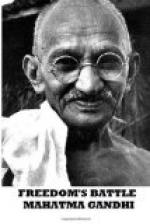When at Amritsar last year I pleaded with all the earnestness I could command for co-operation with the Government and for response to the wishes expressed in the Royal Proclamation; I did so because I honestly believed that a new era was about to begin, and that the old spirit of fear, distrust and consequent terrorism was about to give place to the new spirit of respect, trust and good-will. I sincerely believed that the Mussalman sentiment would be placated and that the officers that had misbehaved during the Martial Law regime in the Punjab would be at least dismissed and the people would be otherwise made to feel that a Government that had always been found quick (and rightly) to punish popular excesses would not fail to punish its agents’ misdeeds. But to my amazement and dismay I have discovered that the present representatives of the Empire have become dishonest and unscrupulous. They have no real regard for the wishes of the people of India and they count Indian honour as of little consequence.
I can no longer retain affection for a Government so evilly manned as it is now-a-days. And for me, it is humiliating to retain my freedom and be a witness to the continuing wrong. Mr. Montagu however is certainly right in threatening me with deprivation of my liberty if I persist in endangering the existence of the Government. For that must be the result if my activity bears fruit. My only regret is that inasmuch as Mr. Montagu admits my past services, he might have perceived that there must be something exceptionally bad in the Government if a well-wisher like me could no longer give his affection to it. It was simpler to insist on justice being done to the Mussulmans and to the Punjab than to threaten me with punishment so that the injustice might be perpetuated. Indeed I fully expect it will be found that even in promoting disaffection towards an unjust Government I have rendered greater services to the Empire than I am already credited with.
At the present moment, however, the duty of those who approve of my activity is clear. They ought on no account to resent the deprivation of my liberty, should the Government of India deem it to be their duty to take it away. A citizen has no right to resist such restriction imposed in accordance with the laws of the State to which he belongs. Much less have those who sympathize with him. In my case there can be no question of sympathy. For I deliberately oppose the Government to the extent of trying to put its very existence in jeopardy. For my supporters, therefore, it must be a moment of joy when I am imprisoned. It means the beginning of success if only the supporters continue the policy for which I stand. If the Government arrest me, they would do so in order to stop the progress of non-co-operation which I preach. It follows that if non-co-operation continues with unabated vigour, even after my arrest, the Government must imprison others or grant the people’s wish in order to




